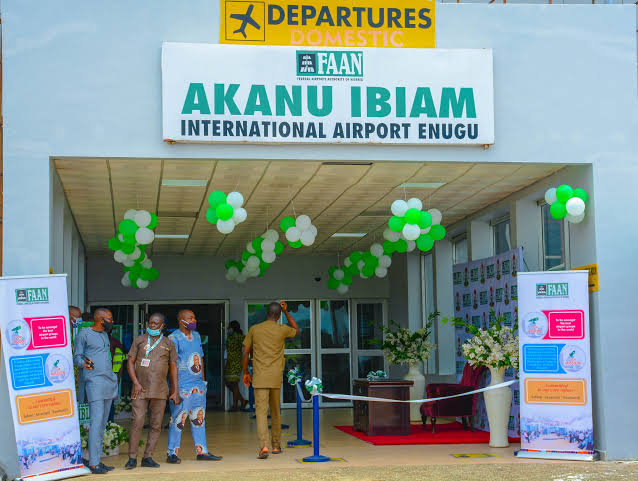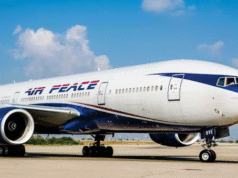The federal government is finalizing a Public-Private Partnership (PPP) deal to hand over management of the Akanu Ibiam International Airport (AIIA) in Enugu to Aero Alliance Consortium under an 80-year concession agreement.
According to Daily Sun, which reviewed a draft of the 64-page agreement, the long-term concession includes significant provisions for airport upgrades, operational management, and personnel transition.
One key element, outlined in Clause 5.1, is the transfer of all current FAAN (Federal Airports Authority of Nigeria) employees at the airport to Aero Alliance for a 24-month transitional period.
“There will be no forced redundancies,” the contract states, adding that any employee found redundant after restructuring “will be reabsorbed by the federal government,” which will also remain responsible for their pensions and gratuities.
The concession is set to last 80 years from the “Effective Date,” with an option to extend for an additional 20 years based on the performance of the concessionaire.
“The concession period (the ‘Concession Term’) shall be eighty (80) years, commencing on the Effective Date and ending on the Eightieth (80th) anniversary (subject to any extension in accordance with this Agreement) or, if earlier, until this Agreement is terminated in accordance with this Agreement,” the agreement states.
Revenue-sharing details appear in Clauses 2.1.4 and 2.2.2. Aero Alliance is expected to remit 1% of net income to the Infrastructure Concession Regulatory Commission (ICRC).
The consortium will have full control over non-aeronautical revenue channels—such as cargo handling, rentals, parking, and lounge fees—without needing government approval, as long as legal thresholds are not violated.
However, “aeronautical tariffs, including landing fees and passenger service charges, must be submitted for government approval.”
These funds must then be allocated to operational costs, maintenance, capital investment, debt servicing, and taxes.
The contract includes mechanisms for oversight. Clauses 14.7 and 15 require the submission of quarterly financial reports, while the government retains the right to audit revenue and expenditures.
Force majeure provisions are laid out in Clause 16.7. In cases of natural disasters, each party will cover its own costs. If disruptions arise from strikes or civil unrest, the concessionaire pays up to insurance limits, with any excess shared equally.
In political events, such as discriminatory legislation, the government will fully compensate the concessionaire.
Termination compensation is addressed in Clause 18. If the government defaults, it must cover outstanding loans, third-party obligations, equity investments, and projected returns.
Clause 2.2 spells out mandatory upgrades. These include full runway rehabilitation, terminal expansion, installation of ICAO-compliant navigation and communication systems, and baggage handling improvements to IATA standards.
Additional works include VIP lounge development, retail spaces, parking, fire and lighting systems, and emergency infrastructure, all under NCAA guidelines.
Clause 8 insists on preventive maintenance and maintaining “optimum” IATA service standards for facilities throughout the concession. The contract allows for optional enhancements such as real estate projects, branding, and technology vendor selection.
Should Aero Alliance fail to complete key upgrades, the government can terminate the deal and seize assets under Clause 19.5. Meanwhile, Clause 2.3 empowers the NCAA to levy fines for safety violations.
Clause 18.6 states that if legal changes require further improvements, the concessionaire will cover the costs when “commercially reasonable.”
If the impact is significant and the costs are deemed unreasonable, both parties will split the expenses.
Oversight will be handled by a five-member compliance committee—three from the government and two from the concessionaire. If decisions are deadlocked, the issue will go to the ICRC for a binding resolution within five business days.
Quarterly updates are mandatory under Clause 13.4, covering financials, operations, maintenance, and progress on KPIs. The agreement becomes effective once both sides confirm in writing that conditions in Clauses 4.1.1 and 4.1.2 have been fulfilled.
Before implementation, approval must come from the Federal Executive Council, and the ICRC must issue a Certificate of Compliance. The concessionaire must also present proof of financing.
If all conditions are not met within 180 days—extendable to 270—either side may withdraw from the agreement.

















